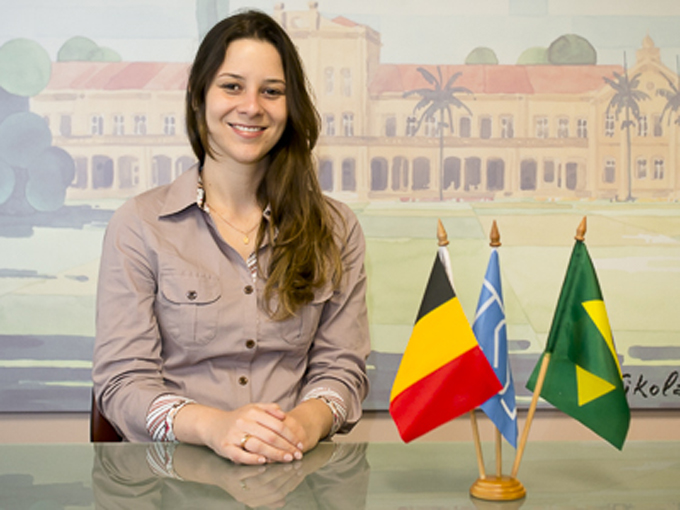Izabela Regina Cardoso de Oliveira has developed statistical studies in a Belgian university
Once again, the agreements established between Luiz de Queiroz College of Agriculture (USP/ESALQ) and several foreign universities show that internationalization intensifies each semester. An example is the student Izabela Regina Cardoso de Oliveira, who completed her doctorate program winning the first double degree diploma of the Agricultural Statistics and Experimentation graduate program (PPG-EEA).
Under the supervision of professor Carlos Tadeu dos Santos Dias, from the Mathematics, Statistics and Chemistry Department (LCE), the researcher began her study in Brazil. Since May, 2013, she went on to develop it at Universiteit Hasselt, in Belgium, and remained there until March, 2014. “At the beginning, we discussed the problem with my Belgian advisor, Geert Molenberghs, and professor Clarice Garcia Borges Demétrio, also from the Mathematics, Statistics and Chemistry Department (LCE), who was in Belgium at that time. Then, the work programme for the next months was defined. It’s importante to point out that the databases used in this paper are all from Brazil, because the line of research of them is a little bit different from ours, because the Biostatistics course in Belgium is designed for medical analysis", says the student.
Up to date with – According to Izabela, within the Statistics, many methods are developed for when you have variables responses that follow a normal distribution probability. “Multiple important quantities or coefficients, in several areas, are calculated assuming that the response of interest follows the distribution”. An example is the coefficient of heritability (h²), widely used in the areas of animal and plant breeding. Few reports are found in the literature about the calculation of this coefficient for non-normal data. “With our proposal, it is possible to consider data of type time-to-event and counting, extending an important concept in genetics for the case where the response variable of interest does not have a normal distribution”.
In practice, this proposal for calculating the heritability coefficient was applied to animal breeding data, in which a variable of interest is time until it reaches a pre-specified weight. The researcher worked with data from progeny of Nellore and sought to identify the genetic contribution to the total variability of this feature. Another example used, considered in the case of counting, was the calculation of h² for some features evaluated in maize breeding programs. “The data from this second study were obtained in experiments with maize genotypes and a variable of interest was the number of tassel branches". These data were provided by the Plant Breeding Program from the Genetics Department (LGN) of ESALQ.
For Izabela, the main proposal, which was to obtain expressions for calculating the coefficient of h² for counting and time-to-event data, was attended as a pioneer and it was true to the nature of the data. “We successfully calculate and apply to real database. We have also seen that the resulting expressions are relatively simple and we provide the computational algorithms, making the implementation easier by researchers in the applied área and also makes the proposed methodology more widespread”.
Experiences – During the development of the research abroad, the student attended conferences, symposia, training courses, seminars, master's and doctoral’s dissertations and study group meetings. “I tried fully to live like the doctoral students there and I was also treated as a student of them, without any distinction. I had many friends and I tried to live the Belgian routine. In the event, I had the opportunity to meet leading researchers in our field, including Sir David Cox, who is a big name in Statistics”.
With the first double degree thesis defended at PPG-EEA, Izabela encourages other students to seek the cotutela. “I believe this is a good return we can give to our program and to ESALQ, after so much encouragement and investment in us. Choosing a good advisor and a welcoming overseas university, so the time there will be more pleasurable, what is essential for those who wish to follow the same path as mine”, she concludes.
The project was supported by the National Council for Scientific and Technological Development (CNPq) and the Science Without Borders Program (CsF), Brazilian government project, which provides scholarships to Brazilian undergraduate, graduate and postdoctoral students.
Written by: Raiza Tronquin
Translated by: Tobias de Paula Lima Souza
Proofread by: Marisa Aparecida B. Regitano d'Arce
Photo by: Gerhard Waller
Acom (ESALQ’s Office of Communications)
August 8th, 2014


